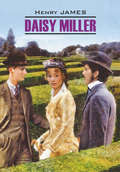
Генри Джеймс
An International Episode
“I fancy you don’t mean that,” said Lord Lambeth, laughing.
“I assure you I mean everything I say,” the young girl declared. “Certainly, from what I have read about English society, it is very different.”
“Ah well, you know,” said her companion, “those things are often described by fellows who know nothing about them. You mustn’t mind what you read.”
“Oh, I shall mind what I read!” Bessie Alden rejoined. “When I read Thackeray and George Eliot, how can I help minding them?”
“Ah well, Thackeray, and George Eliot,” said the young nobleman; “I haven’t read much of them.”
“Don’t you suppose they know about society?” asked Bessie Alden.
“Oh, I daresay they know; they were so very clever. But these fashionable novels,” said Lord Lambeth, “they are awful rot, you know.”
His companion looked at him a moment with her dark blue eyes, and then she looked down in the chasm where the water was tumbling about. “Do you mean Mrs. Gore, for instance?” she said presently, raising her eyes.
“I am afraid I haven’t read that, either,” was the young man’s rejoinder, laughing a little and blushing. “I am afraid you’ll think I am not very intellectual.”
“Reading Mrs. Gore is no proof of intellect. But I like reading everything about English life—even poor books. I am so curious about it.”
“Aren’t ladies always curious?” asked the young man jestingly.
But Bessie Alden appeared to desire to answer his question seriously. “I don’t think so—I don’t think we are enough so—that we care about many things. So it’s all the more of a compliment,” she added, “that I should want to know so much about England.”
The logic here seemed a little close; but Lord Lambeth, made conscious of a compliment, found his natural modesty just at hand. “I am sure you know a great deal more than I do.”
“I really think I know a great deal—for a person who has never been there.”
“Have you really never been there?” cried Lord Lambeth. “Fancy!”
“Never—except in imagination,” said the young girl.
“Fancy!” repeated her companion. “But I daresay you’ll go soon, won’t you?”
“It’s the dream of my life!” declared Bessie Alden, smiling.
“But your sister seems to know a tremendous lot about London,” Lord Lambeth went on.
The young girl was silent a moment. “My sister and I are two very different persons,” she presently said. “She has been a great deal in Europe. She has been in England several times. She has known a great many English people.”
“But you must have known some, too,” said Lord Lambeth.
“I don’t think that I have ever spoken to one before. You are the first Englishman that—to my knowledge—I have ever talked with.”
Bessie Alden made this statement with a certain gravity—almost, as it seemed to Lord Lambeth, an impressiveness. Attempts at impressiveness always made him feel awkward, and he now began to laugh and swing his stick. “Ah, you would have been sure to know!” he said. And then he added, after an instant, “I’m sorry I am not a better specimen.”
The young girl looked away; but she smiled, laying aside her impressiveness. “You must remember that you are only a beginning,” she said. Then she retraced her steps, leading the way back to the lawn, where they saw Mrs. Westgate come toward them with Percy Beaumont still at her side. “Perhaps I shall go to England next year,” Miss Alden continued; “I want to, immensely. My sister is going to Europe, and she has asked me to go with her. If we go, I shall make her stay as long as possible in London.”
“Ah, you must come in July,” said Lord Lambeth. “That’s the time when there is most going on.”
“I don’t think I can wait till July,” the young girl rejoined. “By the first of May I shall be very impatient.” They had gone further, and Mrs. Westgate and her companion were near them. “Kitty,” said Miss Alden, “I have given out that we are going to London next May. So please to conduct yourself accordingly.”
Percy Beaumont wore a somewhat animated—even a slightly irritated—air. He was by no means so handsome a man as his cousin, although in his cousin’s absence he might have passed for a striking specimen of the tall, muscular, fair-bearded, clear-eyed Englishman. Just now Beaumont’s clear eyes, which were small and of a pale gray color, had a rather troubled light, and, after glancing at Bessie Alden while she spoke, he rested them upon his kinsman. Mrs. Westgate meanwhile, with her superfluously pretty gaze, looked at everyone alike.
“You had better wait till the time comes,” she said to her sister. “Perhaps next May you won’t care so much about London. Mr. Beaumont and I,” she went on, smiling at her companion, “have had a tremendous discussion. We don’t agree about anything. It’s perfectly delightful.”
“Oh, I say, Percy!” exclaimed Lord Lambeth.
“I disagree,” said Beaumont, stroking down his back hair, “even to the point of not thinking it delightful.”
“Oh, I say!” cried Lord Lambeth again.
“I don’t see anything delightful in my disagreeing with Mrs. Westgate,” said Percy Beaumont.
“Well, I do!” Mrs. Westgate declared; and she turned to her sister. “You know you have to go to town. The phaeton is there. You had better take Lord Lambeth.”
At this point Percy Beaumont certainly looked straight at his kinsman; he tried to catch his eye. But Lord Lambeth would not look at him; his own eyes were better occupied. “I shall be very happy,” cried Bessie Alden. “I am only going to some shops. But I will drive you about and show you the place.”
“An American woman who respects herself,” said Mrs. Westgate, turning to Beaumont with her bright expository air, “must buy something every day of her life. If she can not do it herself, she must send out some member of her family for the purpose. So Bessie goes forth to fulfill my mission.”
The young girl had walked away, with Lord Lambeth by her side, to whom she was talking still; and Percy Beaumont watched them as they passed toward the house. “She fulfills her own mission,” he presently said; “that of being a very attractive young lady.”
“I don’t know that I should say very attractive,” Mrs. Westgate rejoined. “She is not so much that as she is charming when you really know her. She is very shy.”
“Oh, indeed!” said Percy Beaumont.
“Extremely shy,” Mrs. Westgate repeated. “But she is a dear good girl; she is a charming species of girl. She is not in the least a flirt; that isn’t at all her line; she doesn’t know the alphabet of that sort of thing. She is very simple, very serious. She has lived a great deal in Boston, with another sister of mine—the eldest of us—who married a Bostonian. She is very cultivated, not at all like me; I am not in the least cultivated. She has studied immensely and read everything; she is what they call in Boston ‘thoughtful.’”
“A rum sort of girl for Lambeth to get hold of!” his lordship’s kinsman privately reflected.
“I really believe,” Mrs. Westgate continued, “that the most charming girl in the world is a Boston superstructure upon a New York fonds; or perhaps a New York superstructure upon a Boston fonds. At any rate, it’s the mixture,” said Mrs. Westgate, who continued to give Percy Beaumont a great deal of information.
Lord Lambeth got into a little basket phaeton with Bessie Alden, and she drove him down the long avenue, whose extent he had measured on foot a couple of hours before, into the ancient town, as it was called in that part of the world, of Newport. The ancient town was a curious affair—a collection of fresh-looking little wooden houses, painted white, scattered over a hillside and clustered about a long straight street paved with enormous cobblestones. There were plenty of shops—a large proportion of which appeared to be those of fruit vendors, with piles of huge watermelons and pumpkins stacked in front of them; and, drawn up before the shops, or bumping about on the cobblestones, were innumerable other basket phaetons freighted with ladies of high fashion, who greeted each other from vehicle to vehicle and conversed on the edge of the pavement in a manner that struck Lord Lambeth as demonstrative, with a great many “Oh, my dears,” and little quick exclamations and caresses. His companion went into seventeen shops—he amused himself with counting them—and accumulated at the bottom of the phaeton a pile of bundles that hardly left the young Englishman a place for his feet. As she had no groom nor footman, he sat in the phaeton to hold the ponies, where, although he was not a particularly acute observer, he saw much to entertain him—especially the ladies just mentioned, who wandered up and down with the appearance of a kind of aimless intentness, as if they were looking for something to buy, and who, tripping in and out of their vehicles, displayed remarkably pretty feet. It all seemed to Lord Lambeth very odd, and bright, and gay. Of course, before they got back to the villa, he had had a great deal of desultory conversation with Bessie Alden.
The young Englishmen spent the whole of that day and the whole of many successive days in what the French call the intimite of their new friends. They agreed that it was extremely jolly, that they had never known anything more agreeable. It is not proposed to narrate minutely the incidents of their sojourn on this charming shore; though if it were convenient I might present a record of impressions nonetheless delectable that they were not exhaustively analyzed. Many of them still linger in the minds of our travelers, attended by a train of harmonious images—images of brilliant mornings on lawns and piazzas that overlooked the sea; of innumerable pretty girls; of infinite lounging and talking and laughing and flirting and lunching and dining; of universal friendliness and frankness; of occasions on which they knew everyone and everything and had an extraordinary sense of ease; of drives and rides in the late afternoon over gleaming beaches, on long sea roads, beneath a sky lighted up by marvelous sunsets; of suppers, on the return, informal, irregular, agreeable; of evenings at open windows or on the perpetual verandas, in the summer starlight, above the warm Atlantic. The young Englishmen were introduced to everybody, entertained by everybody, intimate with everybody. At the end of three days they had removed their luggage from the hotel and had gone to stay with Mrs. Westgate—a step to which Percy Beaumont at first offered some conscientious opposition. I call his opposition conscientious, because it was founded upon some talk that he had had, on the second day, with Bessie Alden. He had indeed had a good deal of talk with her, for she was not literally always in conversation with Lord Lambeth. He had meditated upon Mrs. Westgate’s account of her sister, and he discovered for himself that the young lady was clever, and appeared to have read a great deal. She seemed very nice, though he could not make out, as Mrs. Westgate had said, she was shy. If she was shy, she carried it off very well.
“Mr. Beaumont,” she had said, “please tell me something about Lord Lambeth’s family. How would you say it in England—his position?”
“His position?” Percy Beaumont repeated.
“His rank, or whatever you call it. Unfortunately we haven’t got a peerage, like the people in Thackeray.”
“That’s a great pity,” said Beaumont. “You would find it all set forth there so much better than I can do it.”
“He is a peer, then?”
“Oh, yes, he is a peer.”
“And has he any other title than Lord Lambeth?”
“His title is the Marquis of Lambeth,” said Beaumont; and then he was silent. Bessie Alden appeared to be looking at him with interest. “He is the son of the Duke of Bayswater,” he added presently.
“The eldest son?”
“The only son.”
“And are his parents living?”
“Oh yes; if his father were not living he would be a duke.”
“So that when his father dies,” pursued Bessie Alden with more simplicity than might have been expected in a clever girl, “he will become Duke of Bayswater?”
“Of course,” said Percy Beaumont. “But his father is in excellent health.”
“And his mother?”
Beaumont smiled a little. “The duchess is uncommonly robust.”
“And has he any sisters?”
“Yes, there are two.”
“And what are they called?”
“One of them is married. She is the Countess of Pimlico.”
“And the other?”
“The other is unmarried; she is plain Lady Julia.”
Bessie Alden looked at him a moment. “Is she very plain?”
Beaumont began to laugh again. “You would not find her so handsome as her brother,” he said; and it was after this that he attempted to dissuade the heir of the Duke of Bayswater from accepting Mrs. Westgate’s invitation. “Depend upon it,” he said, “that girl means to try for you.”
“It seems to me you are doing your best to make a fool of me,” the modest young nobleman answered.
“She has been asking me,” said Beaumont, “all about your people and your possessions.”
“I am sure it is very good of her!” Lord Lambeth rejoined.
“Well, then,” observed his companion, “if you go, you go with your eyes open.”
“Damn my eyes!” exclaimed Lord Lambeth. “If one is to be a dozen times a day at the house, it is a great deal more convenient to sleep there. I am sick of traveling up and down this beastly avenue.”
Since he had determined to go, Percy Beaumont would, of course, have been very sorry to allow him to go alone; he was a man of conscience, and he remembered his promise to the duchess. It was obviously the memory of this promise that made him say to his companion a couple of days later that he rather wondered he should be so fond of that girl.
“In the first place, how do you know how fond I am of her?” asked Lord Lambeth. “And, in the second place, why shouldn’t I be fond of her?”
“I shouldn’t think she would be in your line.”
“What do you call my ‘line’? You don’t set her down as ‘fast’?”
“Exactly so. Mrs. Westgate tells me that there is no such thing as the ‘fast girl’ in America; that it’s an English invention, and that the term has no meaning here.”
“All the better. It’s an animal I detest.”
“You prefer a bluestocking.”
“Is that what you call Miss Alden?”
“Her sister tells me,” said Percy Beaumont, “that she is tremendously literary.”
“I don’t know anything about that. She is certainly very clever.”
“Well,” said Beaumont, “I should have supposed you would have found that sort of thing awfully slow.”
“In point of fact,” Lord Lambeth rejoined, “I find it uncommonly lively.”
After this, Percy Beaumont held his tongue; but on the 10th of August he wrote to the Duchess of Bayswater. He was, as I have said, a man of conscience, and he had a strong, incorruptible sense of the proprieties of life. His kinsman, meanwhile, was having a great deal of talk with Bessie Alden—on the red sea rocks beyond the lawn; in the course of long island rides, with a slow return in the glowing twilight; on the deep veranda late in the evening. Lord Lambeth, who had stayed at many houses, had never stayed at a house in which it was possible for a young man to converse so frequently with a young lady. This young lady no longer applied to Percy Beaumont for information concerning his lordship. She addressed herself directly to the young nobleman. She asked him a great many questions, some of which bored him a little; for he took no pleasure in talking about himself.
“Lord Lambeth,” said Bessie Alden, “are you a hereditary legislator?”
“Oh, I say!” cried Lord Lambeth, “don’t make me call myself such names as that.”
“But you are a member of Parliament,” said the young girl.
“I don’t like the sound of that, either.”
“Don’t you sit in the House of Lords?” Bessie Alden went on.
“Very seldom,” said Lord Lambeth.
“Is it an important position?” she asked.
“Oh, dear, no,” said Lord Lambeth.
“I should think it would be very grand,” said Bessie Alden, “to possess, simply by an accident of birth, the right to make laws for a great nation.”
“Ah, but one doesn’t make laws. It’s a great humbug.”
“I don’t believe that,” the young girl declared. “It must be a great privilege, and I should think that if one thought of it in the right way—from a high point of view—it would be very inspiring.”
“The less one thinks of it, the better,” Lord Lambeth affirmed.
“I think it’s tremendous,” said Bessie Alden; and on another occasion she asked him if he had any tenantry. Hereupon it was that, as I have said, he was a little bored.
“Do you want to buy up their leases?” he asked.
“Well, have you got any livings?” she demanded.
“Oh, I say!” he cried. “Have you got a clergyman that is looking out?” But she made him tell her that he had a castle; he confessed to but one. It was the place in which he had been born and brought up, and, as he had an old-time liking for it, he was beguiled into describing it a little and saying it was really very jolly. Bessie Alden listened with great interest and declared that she would give the world to see such a place. Whereupon—“It would be awfully kind of you to come and stay there,” said Lord Lambeth. He took a vague satisfaction in the circumstance that Percy Beaumont had not heard him make the remark I have just recorded.
Mr. Westgate all this time had not, as they said at Newport, “come on.” His wife more than once announced that she expected him on the morrow; but on the morrow she wandered about a little, with a telegram in her jeweled fingers, declaring it was very tiresome that his business detained him in New York; that he could only hope the Englishmen were having a good time. “I must say,” said Mrs. Westgate, “that it is no thanks to him if you are.” And she went on to explain, while she continued that slow-paced promenade which enabled her well-adjusted skirts to display themselves so advantageously, that unfortunately in America there was no leisure class. It was Lord Lambeth’s theory, freely propounded when the young men were together, that Percy Beaumont was having a very good time with Mrs. Westgate, and that, under the pretext of meeting for the purpose of animated discussion, they were indulging in practices that imparted a shade of hypocrisy to the lady’s regret for her husband’s absence.
“I assure you we are always discussing and differing,” said Percy Beaumont. “She is awfully argumentative. American ladies certainly don’t mind contradicting you. Upon my word I don’t think I was ever treated so by a woman before. She’s so devilish positive.”
Mrs. Westgate’s positive quality, however, evidently had its attractions, for Beaumont was constantly at his hostess’s side. He detached himself one day to the extent of going to New York to talk over the Tennessee Central with Mr. Westgate; but he was absent only forty-eight hours, during which, with Mr. Westgate’s assistance, he completely settled this piece of business. “They certainly do things quickly in New York,” he observed to his cousin; and he added that Mr. Westgate had seemed very uneasy lest his wife should miss her visitor—he had been in such an awful hurry to send him back to her. “I’m afraid you’ll never come up to an American husband, if that’s what the wives expect,” he said to Lord Lambeth.
Mrs. Westgate, however, was not to enjoy much longer the entertainment with which an indulgent husband had desired to keep her provided. On the 21st of August Lord Lambeth received a telegram from his mother, requesting him to return immediately to England; his father had been taken ill, and it was his filial duty to come to him.
The young Englishman was visibly annoyed. “What the deuce does it mean?” he asked of his kinsman. “What am I to do?”
Percy Beaumont was annoyed as well; he had deemed it his duty, as I have narrated, to write to the duchess, but he had not expected that this distinguished woman would act so promptly upon his hint. “It means,” he said, “that your father is laid up. I don’t suppose it’s anything serious; but you have no option. Take the first steamer; but don’t be alarmed.”
Lord Lambeth made his farewells; but the few last words that he exchanged with Bessie Alden are the only ones that have a place in our record. “Of course I needn’t assure you,” he said, “that if you should come to England next year, I expect to be the first person that you inform of it.”
Bessie Alden looked at him a little, and she smiled. “Oh, if we come to London,” she answered, “I should think you would hear of it.”
Percy Beaumont returned with his cousin, and his sense of duty compelled him, one windless afternoon, in mid-Atlantic, to say to Lord Lambeth that he suspected that the duchess’s telegram was in part the result of something he himself had written to her. “I wrote to her—as I explicitly notified you I had promised to do—that you were extremely interested in a little American girl.”
Lord Lambeth was extremely angry, and he indulged for some moments in the simple language of indignation. But I have said that he was a reasonable young man, and I can give no better proof of it than the fact that he remarked to his companion at the end of half an hour, “You were quite right, after all. I am very much interested in her. Only, to be fair,” he added, “you should have told my mother also that she is not—seriously—interested in me.”
Percy Beaumont gave a little laugh. “There is nothing so charming as modesty in a young man in your position. That speech is a capital proof that you are sweet on her.”
“She is not interested—she is not!” Lord Lambeth repeated.
“My dear fellow,” said his companion, “you are very far gone.”







